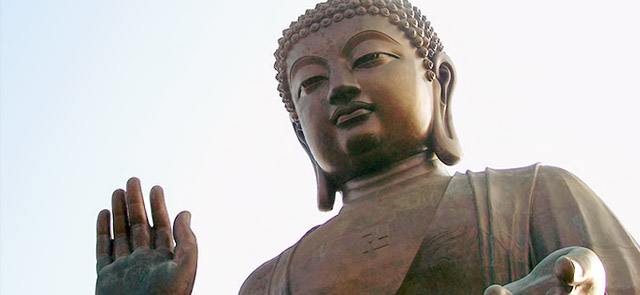The term Impersonality is recognized by Buddhist as one of the Three Clear Conceptions or Threefold knowledge; namely Impermanence – meaning that all is impermanent, Suffering – meaning all is sorrowful and Not-Self - meaning all is devoid of a self . This is an important part of the Buddhist teachings and it is part of what we might call the doctrinal contents of wisdom. In other words, when we talk about the knowledge and the understanding that is implied by wisdom, we have this teaching in mind.
Understanding impermanence is an aid to the understanding of the ultimate nature.
Master Shi Yan Zhuo
We often think that there must be a personality or a self that is real and permanent, otherwise we would not exist or experience things in life. However, the Shakyamuni Buddha taught that there is no real, permanent and independent personality or self at all.
This is the Third Clear Conception or the third characteristic of existence. If a permanent and independent self really existed, one should be able to identify it. Some people may say that the body is the self, or that mind is the self. However, both ideas are wrong. Both body and mind are impermanent, ever changing and subject to destruction. They depend on many factors for their existence. Neither body nor mind can possibly be the permanent and independent self.
If the body were the self, it would be able to will itself to be strong or fair. However the body grows tired, hungry and falls sick against its will, so the body cannot be the personality or self.
Similarly, if the mind were the self, it would do whatever it wished. But the mind often runs away from what it knows to be right, and run after what is wrong. It becomes disturbed, distracted and excited against its will. Therefore the mind is also not the self.
When people say, for instance, “I am going for a walk”, they are just using a convenient name for “I” for a collection of physical and mental factors. In reality, there is no I or self.
So long as people think that the self is permanent and independent, they are bound to be self centred and egoistic. Not only will feel constantly threatened by people and situations, but they will also feel compelled to protect themselves, their possessions, and even their opinions, at any cost.
But once people realise that the self is just a convenient name for a collection of constantly changing physical and mental factors, they will no longer cling to it in fear and insecurity. They will find it easier to grow, learn, develop, and to be generous, kind and compassionate because they will no longer need to be constantly on the defensive.
Why should we care to reject the idea of self? Understanding the fact of impersonality can help people deal more effectively with everyday situation. It encourages the cultivation of Good Conduct and helps one to progress towards happiness, peace and Enlightenment.







